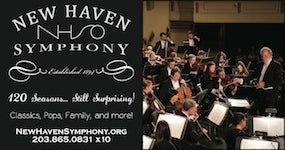We live in a fine time to find caffeine in the Elm City’s piping hot coffee scene, each bean shop with its own alluring aroma.
Fuel Coffee Shop, tucked away behind Wooster Square at 516 Chapel Street, is a haven for vegetarians and vegans and those looking for fair trade and organic brews. Favorite meals include the tofu scramble wrap with fresh avocado and tomato, and the pesto-crusted grilled cheese. Fuel’s espresso is strong but not overpowering, and it works well in seasonal specialties like the Pumpkin Latte, made with real, organic pumpkin filling. Small, simple and quiet, the atmosphere is more tea than joe, a great place to power forward in relative solitude.
Koffee?, on the other hand, is lively indeed. Near the corner of Audubon Street and Whitney Avenue downtown, it has an overwhelming variety of seating options—tables and chairs along the sidewalk in front of the shop, couches, cushioned chairs and barstools inside, and wrought iron benches in a backyard garden—and yet it’s often a struggle to grab one. Here, the pastries, many of them baked in-house, are not to be missed. At 5 p.m. each night, Koffee? transforms into Koffee After Dark, which the website describes as “craft beer, wine, cheese and good conversation.”
sponsored by
Manjares, a cafe near the corner of West Rock Avenue and Whalley Avenue in Westville, is another shop that undergoes an eventide transformation. Thursday, Friday and Saturday nights at 5 p.m., Manjares trades its macchiatos and mochas for wine and Spanish cheeses, rolling out a full Spanish-style tapas menu. Standouts include sticky-sweet figs wrapped up with a slice of savory Serrano ham and the Pastelón: lean ground beef stuffed between two pieces of plantain and topped with cheddar cheese, like a heretical lasagna. Don’t skimp on dessert here, either. Owner Ana De Los Angeles spent twenty years as a pastry chef in New York City before opening Manjares, and continues to ply her craft in the kitchen. For dunking, Manjares serves up dark, nutty brews and baristas here pull a wickedly strong espresso. You can’t go wrong with a Cortado, an espresso with just a touch of warm milk.
Just up the street, on the corner of Edgewood and West Rock Avenues, sits Deja Brew, a charming little cafe across from the Edgewood Magnet School. Each day, moments after the final school bell rings, the shop is flooded with giddy middle-schoolers, counting out pocket change in hopes of snagging an ice cream cone or a gigantic chocolate chip cookie. There’s a coziness to Deja Brew not found elsewhere. A fully adorned mantel above the fireplace—told you it was cozy—complete with framed pictures and various knick-knacks, a well-stocked magazine rack and other small, decorative touches create the feel of an inviting living room for sipping back and relaxing.
If you pine for locally roasted beans, New Haven’s got some fine options. Leading the charge is Willoughby’s, one of the oldest and most flavorful java haunts in town today. Since 1985, Willoughby’s has been a New Haven institution, with its first combo shop and roasting facility opening that year on Chapel Street. Eventually, as the shop expanded to additional storefronts in New Haven, Branford and Madison, the demand for its beans grew enough to prompt the opening of a larger, central roasting plant in Branford. Today, Willoughby’s sources beans from around the world and ships them back out to the world via online orders, but we needn’t rely on postal service to enjoy its critically acclaimed varieties.
sponsored by
Blue State Coffee is another shop that boasts its own roasts. It also uses strictly organic, fair-trade beans in the process, part and parcel to Blue State’s central missions of sustainability and charity. 2% of all sales go to several chosen local non-profit organizations, with customers getting to choose where their 2% goes. Additionally, most materials Blue State uses are recyclable or compostable, and discounts are to be found for customers who bring their own travel mugs. One of Blue State’s most intriguing menu options is its Cascara, made from dried coffee cherries after the bean has been removed. The result is a slightly sweet, highly caffeinated brew, with lingering smacks of apple and plum on the tongue. All three of Blue State’s locations are usually bustling with all manner of graduate and undergraduate students typing away, trudging bleary-eyed through last-minute research papers.
There is, however, a coffee shop where you won’t find any computers. Lulu’s has been a fixture in East Rock on Cottage Street for over twenty years. In 2009, owner Lulu DeCarrone took a big risk and banned laptop use. In 2012, she told NPR’s Marketplace that one day, while working the register, she noticed an abundance of patrons glued to their computers. In that same interview, she said, “I remember thinking, ‘This is like a crypt. I don’t like the feel of it.’” The ban went into effect, and still the customers kept coming. On a recent weekday afternoon, two old friends sat and discussed the origins of organized crime. Later, they turned to the shop’s lone barista and quizzed him on the variations of New England accents. The coffee here tends to be dark and strong, with a hint of chocolate.
New Haven serves up a mean bean, and what precedes isn’t the whole story. But it’s enough for now. If my recent attempt at trying them all in one day is any indication, you can make it to four spots before your head starts to feel as if it’s floating away.
Written and photographed by Jake Goldman.










